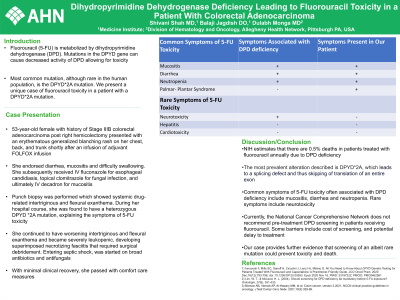Monday Poster Session
Category: Colon
P1645 - Dihydropyrimidine Dehydrogenase Deficiency Leading to Fluorouracil Toxicity in a Patient With Colorectal Adenocarcinoma
Monday, October 23, 2023
10:30 AM - 4:15 PM PT
Location: Exhibit Hall

Has Audio
- BJ
Balaji Jagdish, DO
Allegheny General Hospital
Pittsburgh, Pennsylvania
Presenting Author(s)
Shivani Shah, MD, Balaji Jagdish, DO, Dulabh Monga, MD
Allegheny General Hospital, Pittsburgh, PA
Introduction: Dihydropyrimidine dehydrogenase (DPYD) is an enzyme that metabolizes fluorouracil (5-FU). A mutation in its gene causes decreased activity of DPYD propagating 5-FU toxicity. The prevalence of this mutation is 3-5% in the general population, and the most common variant is DPYD*2A. Patients with the mutation have a 50-60% risk of grade 3-4 5-FU toxicity (severe diarrhea, mucositis/stomatitis, neurotoxicity, skin changes, and pancytopenia). We present an exceedingly rare case of 5-FU toxicity in a colorectal adenocarcinoma patient with a DPYD*2A mutation.
Case Description/Methods: A 53 year-old female with a past medical history of Stage IIIB colorectal adenocarcinoma (loss of PMS2, partial loss of MLH1, and intact MSH2 and MSH6) post right hemicolectomy presented with an erythematous blanching rash on her chest, back, trunk, soles of hands and feet shortly after her first cycle of adjuvant modified FOLFOX infusion. She endorsed diarrhea, and odynophagia limiting oral intake. Epinephrine, dexamethasone, diphenhydramine and famotidine was given to assist with oral swelling. Clostridium difficile testing was negative. She was started on Nystatin oral suspension, intravenous fluconazole for esophageal candidiasis and topical clomitrazole, which did not provide relief. Therefore, intravenous dexamethasone 20 mg for five days was started. As Steven’s Johnsons remained on the differential, a punch biopsy of the left groin was performed, which showed systemic drug-related intertriginous and flexural exanthema. She was noted to be positive for a heterozygous DPYD *2A mutation. She experienced worsening intertriginous and flexural exanthema, palmoplantar erythema and neutropenia. Ultimately, the patient developed superimposed necrotizing fasciitis requiring antibiotics, antifungals and surgical debridement. The patient unfortunately continued to deteriorate, in septic shock requiring intensive care. She ultimately passed after opting for comfort care.
Discussion: Our patient presented with many of the common symptoms associated with 5-FU toxicity, including Grade 4 mucositis and diarrhea in the setting of a DPD mutation. Currently from the National Cancer Comprehensive Network, there are no guidelines for pre-treatment DPD screening. Some barriers may include cost of screening, and potential delay to treatment. However, our case provides further evidence that screening of an albeit rare mutation could prevent toxicity, adverse outcomes, and decrease overall healthcare cost and burden with early detection.
Disclosures:
Shivani Shah, MD, Balaji Jagdish, DO, Dulabh Monga, MD. P1645 - Dihydropyrimidine Dehydrogenase Deficiency Leading to Fluorouracil Toxicity in a Patient With Colorectal Adenocarcinoma, ACG 2023 Annual Scientific Meeting Abstracts. Vancouver, BC, Canada: American College of Gastroenterology.
Allegheny General Hospital, Pittsburgh, PA
Introduction: Dihydropyrimidine dehydrogenase (DPYD) is an enzyme that metabolizes fluorouracil (5-FU). A mutation in its gene causes decreased activity of DPYD propagating 5-FU toxicity. The prevalence of this mutation is 3-5% in the general population, and the most common variant is DPYD*2A. Patients with the mutation have a 50-60% risk of grade 3-4 5-FU toxicity (severe diarrhea, mucositis/stomatitis, neurotoxicity, skin changes, and pancytopenia). We present an exceedingly rare case of 5-FU toxicity in a colorectal adenocarcinoma patient with a DPYD*2A mutation.
Case Description/Methods: A 53 year-old female with a past medical history of Stage IIIB colorectal adenocarcinoma (loss of PMS2, partial loss of MLH1, and intact MSH2 and MSH6) post right hemicolectomy presented with an erythematous blanching rash on her chest, back, trunk, soles of hands and feet shortly after her first cycle of adjuvant modified FOLFOX infusion. She endorsed diarrhea, and odynophagia limiting oral intake. Epinephrine, dexamethasone, diphenhydramine and famotidine was given to assist with oral swelling. Clostridium difficile testing was negative. She was started on Nystatin oral suspension, intravenous fluconazole for esophageal candidiasis and topical clomitrazole, which did not provide relief. Therefore, intravenous dexamethasone 20 mg for five days was started. As Steven’s Johnsons remained on the differential, a punch biopsy of the left groin was performed, which showed systemic drug-related intertriginous and flexural exanthema. She was noted to be positive for a heterozygous DPYD *2A mutation. She experienced worsening intertriginous and flexural exanthema, palmoplantar erythema and neutropenia. Ultimately, the patient developed superimposed necrotizing fasciitis requiring antibiotics, antifungals and surgical debridement. The patient unfortunately continued to deteriorate, in septic shock requiring intensive care. She ultimately passed after opting for comfort care.
Discussion: Our patient presented with many of the common symptoms associated with 5-FU toxicity, including Grade 4 mucositis and diarrhea in the setting of a DPD mutation. Currently from the National Cancer Comprehensive Network, there are no guidelines for pre-treatment DPD screening. Some barriers may include cost of screening, and potential delay to treatment. However, our case provides further evidence that screening of an albeit rare mutation could prevent toxicity, adverse outcomes, and decrease overall healthcare cost and burden with early detection.
Disclosures:
Shivani Shah indicated no relevant financial relationships.
Balaji Jagdish indicated no relevant financial relationships.
Dulabh Monga indicated no relevant financial relationships.
Shivani Shah, MD, Balaji Jagdish, DO, Dulabh Monga, MD. P1645 - Dihydropyrimidine Dehydrogenase Deficiency Leading to Fluorouracil Toxicity in a Patient With Colorectal Adenocarcinoma, ACG 2023 Annual Scientific Meeting Abstracts. Vancouver, BC, Canada: American College of Gastroenterology.
